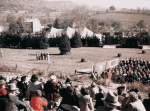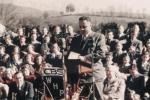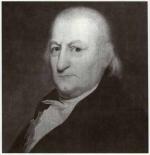![header=[Marker Text] body=[Aaron Levy, a Jewish immigrant who founded this village in 1786, donated ground for Lutheran and Reformed congregations here and presented them with a pewter communion set. In remembrance of his generosity, 30,000 people gathered in Aaronsburg on October 23, 1949, for a day-long celebration of religious and racial understanding. It included a huge outdoor pageant on a natural stage just north of this site.
] sign](http://explorepahistory.com/kora/files/1/10/1-A-29-139-ExplorePAHistory-a0a1v9-a_450.gif)
Mouse over for marker text
Name:
The Aaronsburg Story
Region:
Valleys of the Susquehanna
County:
Centre
Marker Location:
PA 45, East end of Aaronsburg
Dedication Date:
October 23, 1997
Behind the Marker
The crisp October air and the bright autumn leaves splashing color across the rolling hills of central Pennsylvania energized the people of the town. Just the day before, rain and cold winds had depressed spirits. Many had wondered if the long awaited event would have to be canceled. When the rain stopped in the middle of the night, townsmen rushed to restore order to the collapsed tents, fallen wires and torn ribbons. Working by the light of their headlights, they managed to greet the morning's crowds with a beautiful sight.
Most cities across the United States and the world had been breathing sighs of relief since the close of World War II. Nazi Germany had been crushed and Japan was under American control. While the joy of seeing loved ones return and the hope of future peace filled many a town with happiness, little could match the extraordinary event taking place in the small town of Aaronsburg, Pennsylvania.
In 1949, the village gathered to commemorate the actions of Aaronsburg's founder 160 years earlier. Sometime around 1789, Aaron Levy, the Jewish settler and founder of Aaronsburg, had deeded the town he founded to local German Protestants. In addition to this generous act, he donated a pewter communion set to their small church. His actions were the cause of all this activity. Now, five years after the end of the Holocaust, Aaronsburg had decided to celebrate their historic roots of religious toleration and peaceful coexistence.
When Aaron Levy purchased some 334 acres in 1779, he had hoped to transform his wilderness property into the seat of government for Northumberland County. The area, known as White Thorn Grove, contained only about twenty families. Undaunted at the small numbers, Levy laid out the plan for the town of Aaronsburg in 1786. His generous offering of a beautiful pewter communion set to the newly formed Salem Lutheran Church in 1799 bound the villagers of Aaronsburg together as no other act could have done. Though the town never achieved the prominence that Levy envisioned, it cherished the heritage of tolerance that Levy had established.
Organized by Pennsylvania Governor's aide, Arthur Lewis, Aaronsburg's celebration promised to attract national attention. As the plans progressed and tasks mounted, convicts from Western State Penitentiary in Pittsburgh helped handle the mounting correspondence. One inmate, a convicted forger, even signed the committee's letters. The day's events included a play entitled The Aaronsburg Story, an open-air pageant called The Issue of an Ideal, a worship service, meal and discussions surrounding religious toleration.
Governor James H. Duff praised the town noting, "The history of Aaronsburg typifies what this nation and the world are trying to do in erasing intolerance of religion, race, and color." Activists ranging from Mr. Julius Thomas of the National Urban League to Sir Mohammed Aly Zafrulla Khan, Vice President of the United Nations General Assembly and Minister of Foreign Affairs for the Government of Pakistan, gathered to discuss "techniques of handling prejudice and prejudiced people" and other issues. Supreme Court Associate Justice Felix Frankfurter, a strong activist in the movement to create a Jewish state in the Middle East, also addressed the gathered crowd.
In total close to 40,000 people gathered on the grounds of the Salem Lutheran Church that day. Writing of the 1949 commemoration, one woman noted that "here in Aaronsburg, in a small church, in a rural area, a congregation and its pastor recognized that they had something in their history to celebrate." The celebration of Aaron Levy's steps that moved from religious toleration to expressions of good will highlighted the legacy begun by William Penn when he first established Pennsylvania as a colony governed by the principles of religious toleration and freedom of conscience. "Aaronsburg's great day," a New York Times reporter wrote, "in its wide significance, was a great day for all of us."
Most cities across the United States and the world had been breathing sighs of relief since the close of World War II. Nazi Germany had been crushed and Japan was under American control. While the joy of seeing loved ones return and the hope of future peace filled many a town with happiness, little could match the extraordinary event taking place in the small town of Aaronsburg, Pennsylvania.
In 1949, the village gathered to commemorate the actions of Aaronsburg's founder 160 years earlier. Sometime around 1789, Aaron Levy, the Jewish settler and founder of Aaronsburg, had deeded the town he founded to local German Protestants. In addition to this generous act, he donated a pewter communion set to their small church. His actions were the cause of all this activity. Now, five years after the end of the Holocaust, Aaronsburg had decided to celebrate their historic roots of religious toleration and peaceful coexistence.
When Aaron Levy purchased some 334 acres in 1779, he had hoped to transform his wilderness property into the seat of government for Northumberland County. The area, known as White Thorn Grove, contained only about twenty families. Undaunted at the small numbers, Levy laid out the plan for the town of Aaronsburg in 1786. His generous offering of a beautiful pewter communion set to the newly formed Salem Lutheran Church in 1799 bound the villagers of Aaronsburg together as no other act could have done. Though the town never achieved the prominence that Levy envisioned, it cherished the heritage of tolerance that Levy had established.
Organized by Pennsylvania Governor's aide, Arthur Lewis, Aaronsburg's celebration promised to attract national attention. As the plans progressed and tasks mounted, convicts from Western State Penitentiary in Pittsburgh helped handle the mounting correspondence. One inmate, a convicted forger, even signed the committee's letters. The day's events included a play entitled The Aaronsburg Story, an open-air pageant called The Issue of an Ideal, a worship service, meal and discussions surrounding religious toleration.
Governor James H. Duff praised the town noting, "The history of Aaronsburg typifies what this nation and the world are trying to do in erasing intolerance of religion, race, and color." Activists ranging from Mr. Julius Thomas of the National Urban League to Sir Mohammed Aly Zafrulla Khan, Vice President of the United Nations General Assembly and Minister of Foreign Affairs for the Government of Pakistan, gathered to discuss "techniques of handling prejudice and prejudiced people" and other issues. Supreme Court Associate Justice Felix Frankfurter, a strong activist in the movement to create a Jewish state in the Middle East, also addressed the gathered crowd.
In total close to 40,000 people gathered on the grounds of the Salem Lutheran Church that day. Writing of the 1949 commemoration, one woman noted that "here in Aaronsburg, in a small church, in a rural area, a congregation and its pastor recognized that they had something in their history to celebrate." The celebration of Aaron Levy's steps that moved from religious toleration to expressions of good will highlighted the legacy begun by William Penn when he first established Pennsylvania as a colony governed by the principles of religious toleration and freedom of conscience. "Aaronsburg's great day," a New York Times reporter wrote, "in its wide significance, was a great day for all of us."







